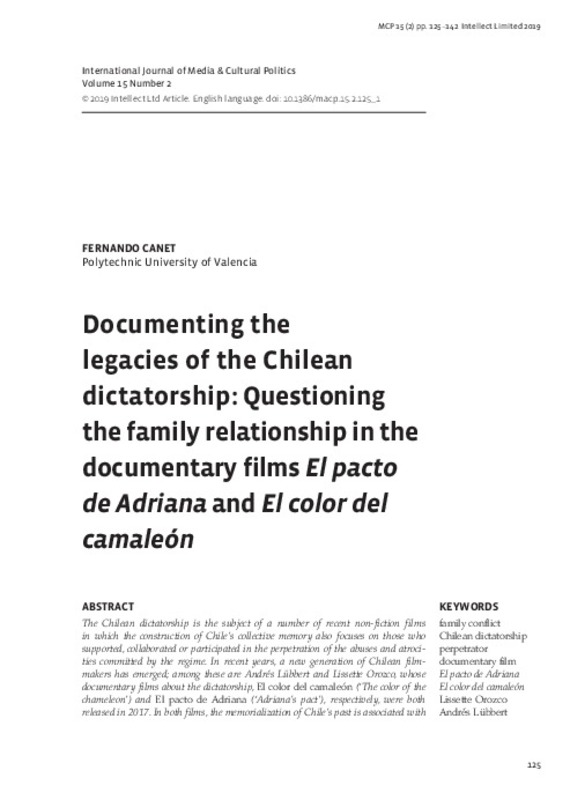JavaScript is disabled for your browser. Some features of this site may not work without it.
Buscar en RiuNet
Listar
Mi cuenta
Estadísticas
Ayuda RiuNet
Admin. UPV
Documenting the legacies of the Chilean dictatorship: Questioning the family relationship in the documentary films El pacto de Adriana and El color del camaleon
Mostrar el registro sencillo del ítem
Ficheros en el ítem
| dc.contributor.author | Canet Centellas, Fernando Javier
|
es_ES |
| dc.date.accessioned | 2020-09-24T12:28:32Z | |
| dc.date.available | 2020-09-24T12:28:32Z | |
| dc.date.issued | 2019-06-01 | es_ES |
| dc.identifier.issn | 1740-8296 | es_ES |
| dc.identifier.uri | http://hdl.handle.net/10251/150625 | |
| dc.description.abstract | [EN] The Chilean dictatorship is the subject of a number of recent non-fiction films in which the construction of Chile's collective memory also focuses on those who supported, collaborated or participated in the perpetration of the abuses and atrocities committed by the regime. In recent years, a new generation of Chilean filmmakers has emerged; among these are Andres Liibbert and Lissette Orozco, whose documentary films about the dictatorship, El color del camaleon ('The color of the chameleon') and El pacto de Adriana ('Adriana's pact'), respectively, were both released in 2017. In both films, the memorialization of Chile's past is associated with the exploration of family memories as the filmmakers engage with Chile's collective memory through family relationships. In this way, family becomes central to a parallel process in which the filmmakers engage in an ethical and emotional questioning of their relationships with their relatives and the family legacy, thereby triggering conflict within the family. This family conflict may be resolved in one of two possible ways: breakdown or reconciliation. The two documentary films studied here offer examples of each possibility, facilitating an exploration of this process and the potential impact of this approach to documenting family relationships. | es_ES |
| dc.language | Inglés | es_ES |
| dc.publisher | Intellect | es_ES |
| dc.relation.ispartof | International Journal of Media and Cultural Politics | es_ES |
| dc.rights | Reserva de todos los derechos | es_ES |
| dc.subject | Family conflict | es_ES |
| dc.subject | Chilean dictatorship | es_ES |
| dc.subject | Perpetrator | es_ES |
| dc.subject | Documentary film | es_ES |
| dc.subject | El pacto de Adriana | es_ES |
| dc.subject | El color del camaleon | es_ES |
| dc.subject | Lissette Orozco | es_ES |
| dc.subject | Andres Lubbert | es_ES |
| dc.subject.classification | COMUNICACION AUDIOVISUAL Y PUBLICIDAD | es_ES |
| dc.title | Documenting the legacies of the Chilean dictatorship: Questioning the family relationship in the documentary films El pacto de Adriana and El color del camaleon | es_ES |
| dc.type | Artículo | es_ES |
| dc.identifier.doi | 10.1386/macp.15.2.125_1 | es_ES |
| dc.rights.accessRights | Abierto | es_ES |
| dc.contributor.affiliation | Universitat Politècnica de València. Departamento de Comunicación Audiovisual, Documentación e Historia del Arte - Departament de Comunicació Audiovisual, Documentació i Història de l'Art | es_ES |
| dc.description.bibliographicCitation | Canet Centellas, FJ. (2019). Documenting the legacies of the Chilean dictatorship: Questioning the family relationship in the documentary films El pacto de Adriana and El color del camaleon. International Journal of Media and Cultural Politics. 15(2):125-142. https://doi.org/10.1386/macp.15.2.125_1 | es_ES |
| dc.description.accrualMethod | S | es_ES |
| dc.relation.publisherversion | https://doi.org/10.1386/macp.15.2.125_1 | es_ES |
| dc.description.upvformatpinicio | 125 | es_ES |
| dc.description.upvformatpfin | 142 | es_ES |
| dc.type.version | info:eu-repo/semantics/publishedVersion | es_ES |
| dc.description.volume | 15 | es_ES |
| dc.description.issue | 2 | es_ES |
| dc.relation.pasarela | S\409835 | es_ES |








